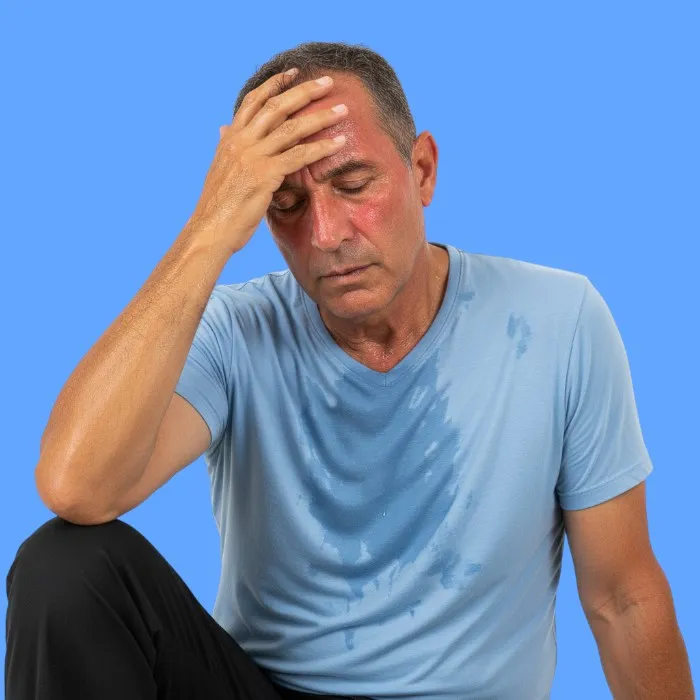What is heat exhaustion?
Heat exhaustion is a medical condition that occurs when the body loses its ability to regulate its internal temperature due to prolonged exposure to high heat or performing physical exertion in hot environments.
This imbalance leads to an abnormally high body temperature, causing uncomfortable symptoms that may develop into serious complications if not addressed promptly.
What are the causes of heat exhaustion?
There are several common causes of this condition, including:
- Direct exposure to sunlight for extended periods.
- Exercising or engaging in physical activities in hot weather.
- Wearing heavy or inappropriate clothing for the weather.
- Not drinking enough water.
- Staying in enclosed or poorly ventilated spaces during heatwaves.
- Taking medications that affect fluid balance, such as diuretics.
- Having chronic illnesses like diabetes or heart disease.
- Being elderly or very young, as the body is less able to adapt to heat.
What are the common symptoms of heat exhaustion?

There are several common symptoms a patient may experience, including:
- Excessive sweating.
- Feeling dizzy or faint.
- Rapid heartbeat.
- Persistent or throbbing headache.
- Nausea or vomiting.
- Pale or cool skin.
- Painful muscle cramps.
- General feeling of fatigue or weakness.
When should you see a doctor?
It is advised to seek medical attention immediately if any of the following occur:
- Symptoms persist for more than an hour despite rest and hydration.
- Loss of consciousness or fainting.
- Body temperature rises above 39°C (102.2°F).
- Continuous vomiting or difficulty breathing.
- Signs of confusion or disorientation appear.
- Sweating stops despite high body temperature.
What are the treatment methods for heat exhaustion?
There are several ways to treat the condition, including:
- Moving the affected person to a cool and shaded place.
- Removing heavy or tight clothing.
- Elevating the legs to improve blood circulation.
- Drinking water or electrolyte-containing beverages.
- Applying cold compresses to the neck and underarms.
- Avoiding physical activity until full recovery.
- In severe cases, immediate emergency care is necessary.
Can heat exhaustion be cured?
Yes, heat exhaustion can be completely cured if addressed promptly and medical instructions are followed carefully.
The speed of recovery depends on the severity of the condition, the patient's age, overall health, and how quickly first aid is administered.
What are the prevention tips for heat exhaustion?
There are several tips to help prevent the condition, including:
- Drinking enough water throughout the day.
- Wearing light, loose-fitting, and light-colored clothing.
- Avoiding direct sun exposure, especially during midday.
- Using sunscreen, hats, and sunglasses.
- Avoiding strenuous activities during peak heat hours.
- Staying in cool or air-conditioned places.
- Monitoring children and the elderly during heatwaves.
- Eating water-rich foods like fruits and vegetables.
What are the possible complications of heat exhaustion?
Some complications may occur if treatment is neglected, such as:
- Progression to heat stroke.
- Kidney failure due to severe dehydration.
- Irregular heart rhythms.
- Severe low blood pressure.
- Loss of consciousness or coma.
- Damage to vital organs.
- Worsening of chronic diseases like heart disease or diabetes.
- Death in severe cases.
Frequently asked questions about heat exhaustion
What is the difference between heat exhaustion and heat stroke?
Heat exhaustion is less severe and treatable, while heat stroke is a life-threatening emergency.
Can children get heat exhaustion?
Yes, children are among the most vulnerable due to their limited ability to regulate body temperature.
Can heat exhaustion occur indoors?
Yes, especially in enclosed or poorly ventilated spaces during heatwaves.
Is excessive sweating always a sign of heat exhaustion?
Not always, but it is one of the early warning signs to watch for.
Summary of the article
Heat exhaustion is a serious health condition caused by prolonged exposure to heat or physical exertion in hot environments. Its symptoms include excessive sweating, dizziness, nausea, and rapid heartbeat.
It can be prevented by staying hydrated, avoiding direct sun exposure, and wearing appropriate clothing. If symptoms appear, quick intervention is essential to avoid complications.
Awareness of the risks and following preventive guidelines is the best way to protect yourself and your loved ones from this silent danger.